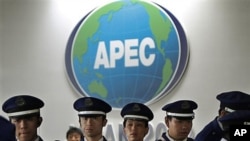Leaders from 21 different countries arrive in Yokohama for the Asia Pacific Economic Cooperation Summit. Free trade and the state of the global economy will dominate the two-day meeting.
A proposed regional free trade zone and measures aimed at putting the global economy on track will be the priorities for the APEC leaders in Yokohama.
They are meeting on the heels of the G20 summit in Seoul, where trade imbalances and currency strains dominated discussions among leaders of the biggest economies.
Japanese Foreign Minister Seiji Maehara has worked to keep the focus on trade at the Asia-Pacific Economic Cooperation gathering.
Maehara reiterates his commitment to establishing a free trade zone that involves all APEC countries. But he stresses that goal is not just to help APEC economies but also the global economy.
The United States says a Trans-Pacific Partnership, involving nine countries is the first step toward an APEC-wide free trade zone. The TPP aims to end import tariffs for a group of nations that includes Australia and Japan.
But the Japanese government faces tough opposition from farmers who say any such pact would increase competition and drive down prices.
Trade and foreign ministers, who met here Wednesday and Thursday, also extended their earlier pledge to curb trade barriers in the next three years. They also vowed to complete the Doha Round of World Trade Organization talks next year. The Doha talks are aimed at increasing global trade, especially for poor nations.
Diplomatic tensions between Japan and China threaten to overshadow the APEC summit.
The two countries have been locked in a heated debate since a Chinese fishing boat rammed in to a Coast Guard ship off disputed islands Tokyo controls.
It is not clear if the leaders of the two countries will hold a bilateral meeting during APEC.
Japanese industries have been particularly concerned because China temporarily cut shipments of rare earth minerals in the wake of the dispute.
On Thursday, Trade Minister Akihiro Ohata made an apparent swipe at China over the issue.
Ohata says that APEC countries must look out for the interests of all countries in the region in the future.
China dominates the market for the minerals, which are used in electronic equipment. Beijing says it does not use them as a diplomatic weapon but is reducing exports to be able to mine the minerals in a sustainable and environmentally sound manner.
World Leaders Arrive for APEC Summit




